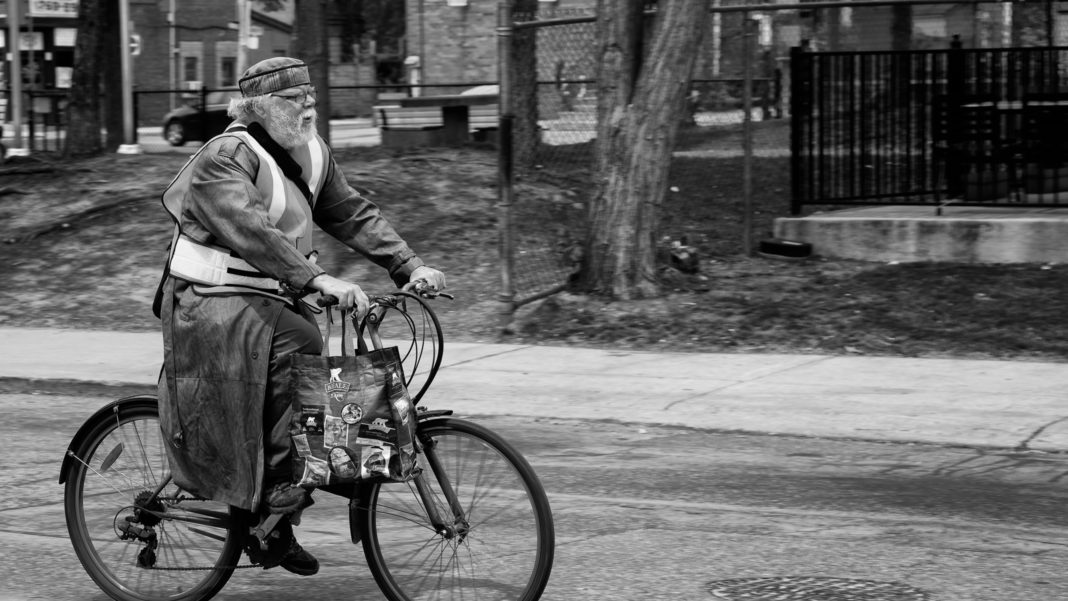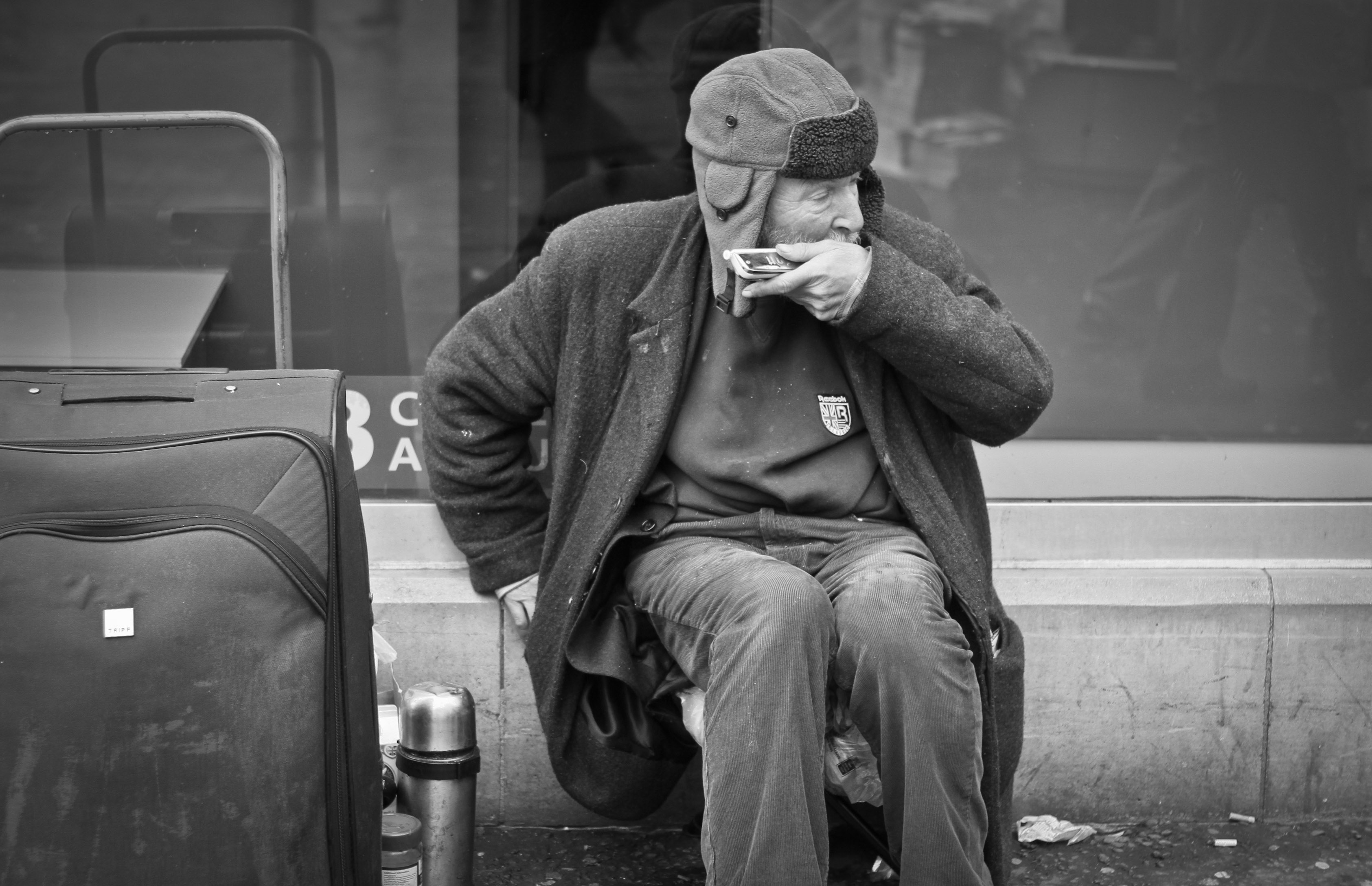November 9th, 2016: the day following the accident.
I called the police in the evening and spoke to the officer in charge, the same one who had taken down my details. He was neither sympathetic nor helpful: all he could tell me was that the old man had been moved to Vancouver and that this meant his condition was serious. This was not good news.
How profound the impact of the accident was going to turn out to be for me, as well as for the old man, was unknown. Maybe it would depend on just how internally open I was to the worst possible outcome, which was perhaps another way of asking: how much was I able to consciously process the trauma?
After only a couple of days, I was already finding it difficult to stay emotionally engaged with the old man’s fate. Our entire relationship consisted of an instant of eye contact, followed by an explosive moment of shared trauma. My own trauma was inseparable from whatever the old man and his family were going through, their suffering was also my suffering, or at least ought to be. It was a trauma spectrum, with me at one end, mostly untouched by it (so far), the old man and his loved ones at the other, their lives torn asunder.

I was suffering from the trauma of having inflicted trauma, and holding a space for that awareness was proving almost impossible to do. Life and all its routines just naturally took over. So far as I was able to stay conscious of what had happened, I experienced a combination of bodily affect (constant low-level distress), compassion for the victims, and an ongoing dread over the possible consequences in my own life.
I was even more tired than usual. I didn’t want to talk about the accident with hardly anyone; it was too big to talk about. I had a one-to-one with Dave Oshana, and spoke to Mitch Fraas. Both conversations helped in some small way to process my experience.
I came upon an article at Chilliwack Times website referring to the accident (it has since gone from the web, including the cache record). There was a photograph of the accident scene, showing me on the sidewalk, knees up and head in my hands. Someone had commented, guessing I was the driver and expressing their sympathy. The article referred to the victim as having sustained “non-life-threatening injuries.”
Instant, massive relief. Even though I knew reading it online didn’t make it true, I chose to believe it.
There were possible problems with my legality to drive that might affect my insurance claims. There was no way of knowing what sort of medical costs the old man’s injuries might lead to, and whether his family might sue for damages. If, as I feared, I was ruffling some high-level feathers with my investigative work, I had now provided the powers-that-be with an easy means for derailing me. I could lose my house, business, and wind up out on the street.

I felt woefully unprepared for what was increasingly likely to happen. Even so, with the natural pull of complacency, I continued acting as if it would all just blow over.
Five days after first finding it, I went back to the online article and found a comment from the old man’s daughter. It had appeared the same day I had read the piece; she wanted to know where the writer had got the idea that the victim had sustained “non-life-threatening injuries”? Her father, she wrote, was in critical condition on a life-support system.
By choosing to believe what I had read, I had given myself a false reprieve for the past five days. Even at the time, I had known I was merely choosing to believe something that might not be true, and thereby letting myself off the hook. Now I was even less prepared than I might have been.
I found out via her comment (made with a Facebook account) that the daughter lived in Hope. She ran a local restaurant where my wife and I had eaten shortly before the accident. It seemed like a confirmation: something had pulled me into this man’s orbit, or him into mine.

Someone else had commented at the article that old people should always have flags on their scooters to avoid these accidents. The daughter responded that her father did have a flag, and that it was visible on the ground in the photograph. Every time some small offering appeared to alleviate my guilt, it seemed as though it was immediately snatched away.
Why hadn’t I seen the old man, the scooter, the flag? Had I seen him but failed to register what I had seen? Was it an actual physical blind spot due to the circumstances? Or, as seemed increasingly likely, was it some sort of perceptual failure on my part, a catastrophic symptom of fragmentation, dissociation, a fatal breakdown of awareness? In over thirty years of driving—including near-fatal head-on collisions in my early twenties and thirties—I had never come close to striking a pedestrian. What was it about this particular set of circumstances that had allowed the unthinkable to occur?
I discovered via the article that the old man was in his early seventies—roughly the age my father had been when he died. My father had spent his last years in a wheelchair. Had some deep, unconscious association been triggered in me by the sight of the old man in his scooter, befogging my awareness at that crucial moment? Had I been irresistibly drawn into some unconscious enactment of the “slaying of the father”—my own personal “King-Kill” event?

I spoke to the daughter on the telephone and told her who I was. She was not unfriendly. She told me her father’s name was Ken, that he had suffered brain damage in the accident and was now on a breathing machine and an intravenous feed, coming in and out of consciousness. I asked if he was in a coma but she said she couldn’t say. Although he was on dialysis, meaning his kidneys were shutting down, she thought he would pull through. Because of how stubborn he was, she said.
I felt conflicted. I wanted to act responsibly and compassionately, to do the right thing by reaching out to the man’s family. But at the same time, if this was the collateral damage of my meltdown, it confirmed my darkest fears that I was carrying a destructive program deep inside of me, making me a danger to others. I had struck down her father—why should she want to communicate with me?
I wanted desperately to know what kind of man Ken was; but short of asking his daughter, there was no way to find out. I didn’t want to intrude to that degree, especially when I was so mixed up about my motives. Even so, I went to see her at the restaurant. She seemed to recognize me, was friendly but wary, her eyes wide as she looked at me, as if in apprehension. Neither of us were quite sure what I was doing there. My presence could hardly be a comfort to her, and it would be obscene for me to be seeking comfort from her. I explained that I didn’t want to be hiding from what happened, or from her, but that I didn’t want to intrude on her grieving. She seemed to understand.

There is a scene in Born on the 4th of July in which Ron Kovic (Tom Cruise) visits the parents of a soldier he accidently shot and killed in Vietnam. He confesses to the parents that he killed their son, stripping them of the consolation that their son at least died for a cause. The scene seemed to display a combination of rank sentimentality with a sheer lack of awareness, as if the character (and the filmmakers) had no clue that Kovic’s confession could only make it worse for the grieving parents.
The last thing I wanted to do was increase someone’s suffering to assuage my own guilt. The truth was that I was afraid I wasn’t properly integrating what had occurred. If that was the case, it implied there would be more severe consequences, consequences that would increase the pressure until I did integrate it. Interacting with his daughter was a way to make it more real for me, to try and meet the consequences head on. Maybe Kovic had been driven by the same desire?
An experience of this sort stretches a person’s cognitive and empathic capacities to their outermost limits. There doesn’t seem any way to possibly do it right, to have an adequate response to something of this sort. It is like we are not configured for such responsibility. It brings home the awareness that life, including our own, is far greater, graver, richer, and more meaningful than we are capable of understanding, much less directing. And yet, we have no choice but to experience it, to stay in the driver’s seat, and to continue moving forward.
All I could do was to try not to retreat from responsibility for my actions, even when it felt so far beyond my capacity to understand. This continues to the present. Writing this entails a similar tangle of feelings and doubts. To be honest, I am only doing so at this point because I think those who read the first part may need to know the rest. Part of me would rather just back away from what I have started, leave it unfinished.
But if there is a reason to testify, then there’s a responsibility to be complete. The truth, nothing but the truth, and the whole truth ~ within my literary and cognitive capacities, at least.


I love you brother, thank you for being here.
.. aliens, cults, movies, grandiose conspiratorial orchestrations ..
this is better.
thanks for powering through and sharing
thanks on both counts; good to hear/know
Jasun, if it’s any consolation sometimes these things happen and are just a terrible tragedy without any karma involved. When I was 14, I was on an underground subway escalator and thought my friend was behind me. I turned around with some smart arse comment to make her laugh, but it was an old woman with a walking stick. I scared her and she fell down the entire subway escalator.
There was a lot of blood and I don’t know what happened because we were told to get out of there by the staff.
I also witnessed someone at my local pub riding down an escalator that was the access to the pub and fell over, falling 2 stories. He was just in front of me. My mates ran down to try and hold his head together. He died.
I’m not sure I have a point, but most people have been through some of the same shit.
wow, that’s quite a story. Once again, massive consequences from a tiny misjudgment.
I’m not tossing about a word like “karma,” but logically either all events are meaningful or none are. So logically, all events are meaningful, the danger is in prematurely assigning meaning. Still, sticking a ‘shit happens’ label on and moving on would be, IMO, an error in the opposite direction.
Maybe, maybe not. I think there is such a thing as karma, at least I hope so. But we aren’t gods. We are but flawed people who possibly will never understand even the most basic underpinnings of karmic law.
The sheer frustration, guilt and anxiety that comes from cruel circumstances. I can’t imagine the experience you had with this.
But, I can say that your writing does me so much good.
You have a remarkable talent for taking highly personal material and being very honest about it. All the while striving for objectivity.
Not very easy.
I hope this site never “croses”
thanks AI; means a lot